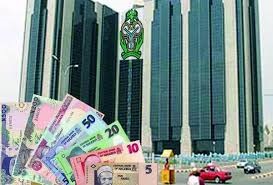THE GLOBAL AND DOMESTIC ENVIRONMENT OF NIGERIA’S ECONOMY
GLOBAL ENVIRONMENT VIS-A-VIS NIGERIA’S ECONOMY
 Nigeria’s economy operates against a backdrop of declining crude oil price (from $114 per barrel in June 2014 to about $38 per barrel by December 2015).
Nigeria’s economy operates against a backdrop of declining crude oil price (from $114 per barrel in June 2014 to about $38 per barrel by December 2015).
In addition to this, the global economic outlook has not been encouraging, there has been a general weakening of economic growth in emerging market economies and security challenges in very many different parts of the World.
The above have tremendous effect and influence on the direction of economic development and aspiration the nation is launching into.
DOMESTIC ENVIRONMENTOF NIGERIA’S ECONOMY
On the domestic side, challenges including insurgency in parts of the North East, high rate of unemployment (especially among the youth), huge infrastructure and housing deficits, among others, characterized the Nigerian economic landscape. These have imposed significant fiscal strains on Government revenues as well as other real sector and external account indicators.
Government in re-appraising the national economy identified the primary goal of reflating and repositioning the economy for change.
Major key objectives are:
• Ensuring a stable macroeconomic environment for real sector development
• Investments in critical infrastructure, science, technology and innovations that will enhance productivity and lower costs of doing business.
• Creating a significant number of jobs to reduce unemployment and underemployment especially among the youth.
• Protecting the poor and vulnerable by special social intervention programmes
• Building an economy that is less vulnerable to oil price shocks by vigorously pursuing economic diversification.
The cornerstone of economic development is prioritized upon sectors such as agriculture, solid minerals, trade and investment, manufacturing and event and eco-tourism.
Of agriculture, the sector roadmap has been deliberately planned to re-focus on privately-driven, large scale and small holder agricultural development, spanning production, processing, storage, marketing and distribution that will lead to self-sufficiency, in local staple foods in quantity and quality. The focus is as well as to put in place policies that will make Nigeria one of the top ten players in World Food and Agricultural export.
Growth Enhancement and Support Scheme (GESS), Agricultural Transformation Agenda (ATA), Youth Empowerment in Agriculture (YEAP) are some of the articulated programmes to revamp the nation’s fortune in Agriculture.
Of Solid minerals development, 44 solid minerals that are potential foreign exchange earners have been identified to be in Nigeria. The economic policy employed by Government is to put in place a strategy that would make solid minerals a viable alternative foreign exchange earner for the country. In doing this, the Government also wants to ensure that there is a safe, secure and humane operational environment for the country’s miners and others who may be licensed to operate in the sector.
Of trade and investment, there is a great emphasis on production and export of non-oil and gas products which will lead to increased national income, job creation and poverty reduction.
Of manufacturing,there is a deliberate effort to expand, deepen and boost manufacturing through small and medium enterprises and entrepreneurship. Relevant policies for skill trainings, grants and other incentives are being rolled out to ensure that the manufacturing sector of the Nigerian economy comes alive to contributing very significantly to the economy.
Of tourism development, Nigeria is known to have vast potentials spanning destination, event and eco-tourism that can be a viable and sustainable alternative source of foreign exchange earnings. Currently, the Nigerian Tourism Development Master Plan is being implemented to ensure proper harnessing of the nation’s potentials in tourism.
General measures of the administration on the economy
• Implementation of the Treasury Single Account (TSA) has provided greater visibility of government revenues and cash flows. Between June 2015 and April 2016, the Federal Government TSA collection clocked N3trillion.
• President Buhari directed the closure of all multiple accounts in Ministries, Departments and Agencies of government, thereby plugging loopholes for leakages with new technology. This is to further instill fiscal discipline,
•The opaque accounting structure of the NNPC has been reconstructed to be more transparent with the closure of more than 40 accounts. As a corporate entity, NNPC is now accountable and more transparent in operations, publishing its monthly financial reports.
•Thepresent administration also resolved the lingering shadowy oil swap deals that had cost the country billions of dollars and left it at the mercy of a few rich Nigerians.
•To alleviate the suffering of Nigerians in September 2015, President Muhamadu Buhari directed the Central Bank of Nigeria to disburse N689.5 billion as bailout to 27 States of the federation to pay salaries.
•To stimulate the economy and reduce poverty, in April 2016, President Buhari approved deferment in the payment of the bailout as States were still reeling under the burden of the fall in commodity prices.
• Records of more than 34,000 ghost workers draining the nation’s resources were expunged from the Federal Civil Service, saving N2.29 billion monthly.
•In 2015, President Buhari ruled out the appointment of a government delegation for pilgrimage to Saudi Arabia. By this decision, the government saved about one million U.S dollars and N30m of local expenses
• Enforcement of the Bank Verification Number: Also the BVN has ensured that the menace of “ghost workers” are being identified and dealt with, while looters with multiple accounts can no longer hide their loot undetected.
• Social Protection: Groundwork for social intervention/palliatives for the poor is being put in place as data is being collated by the economic planning office of the VP in conjunction with the World Bank.
READ MORE:http://www.budgetoffice.gov.ng/


